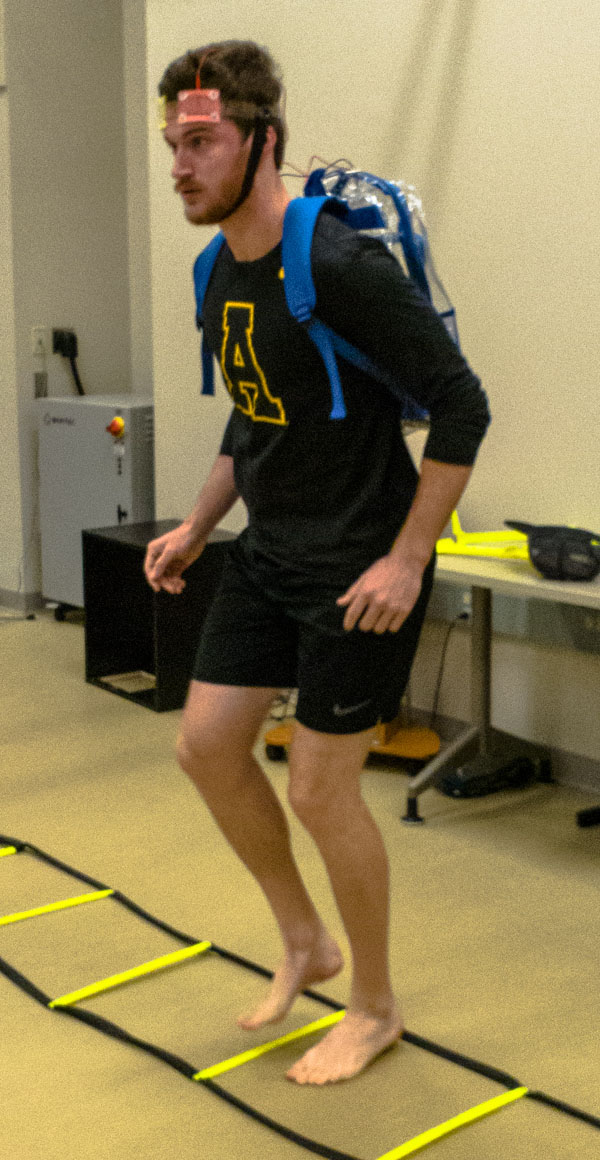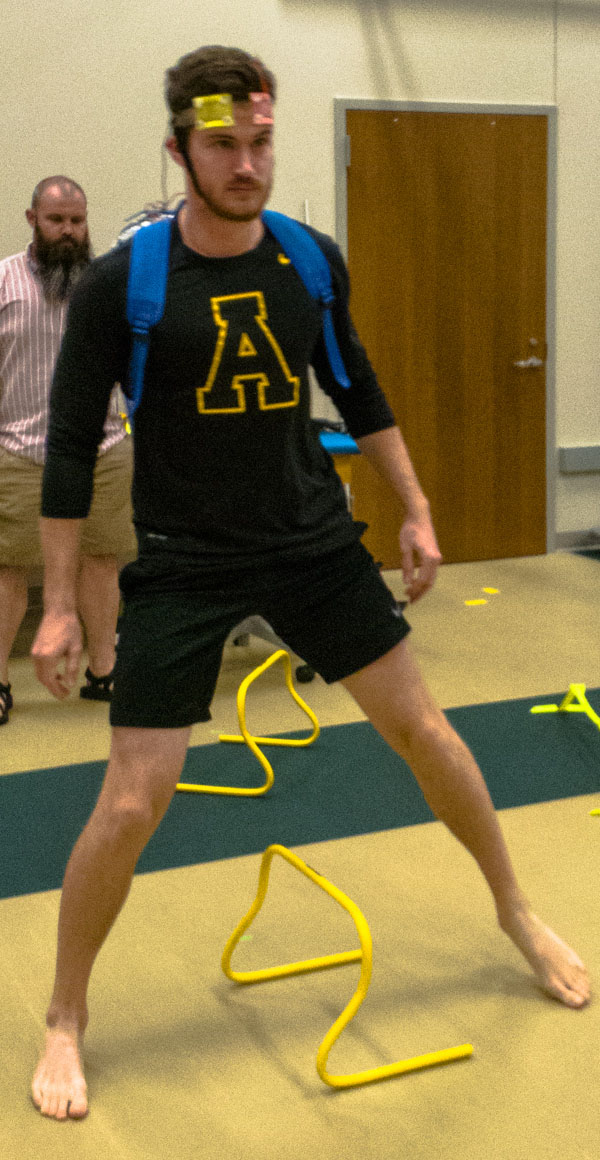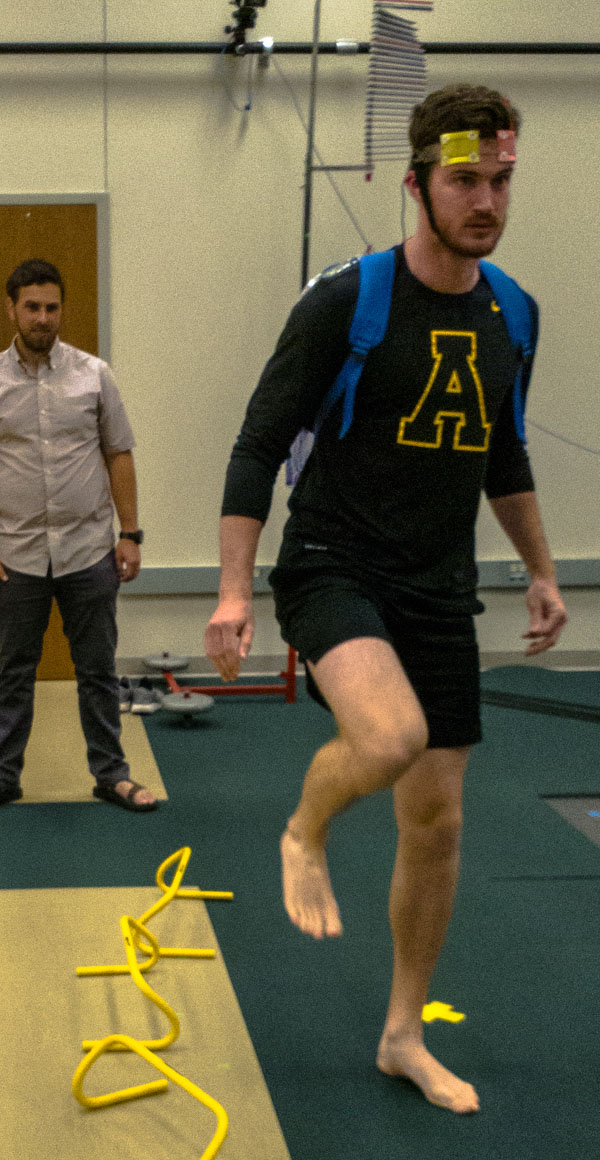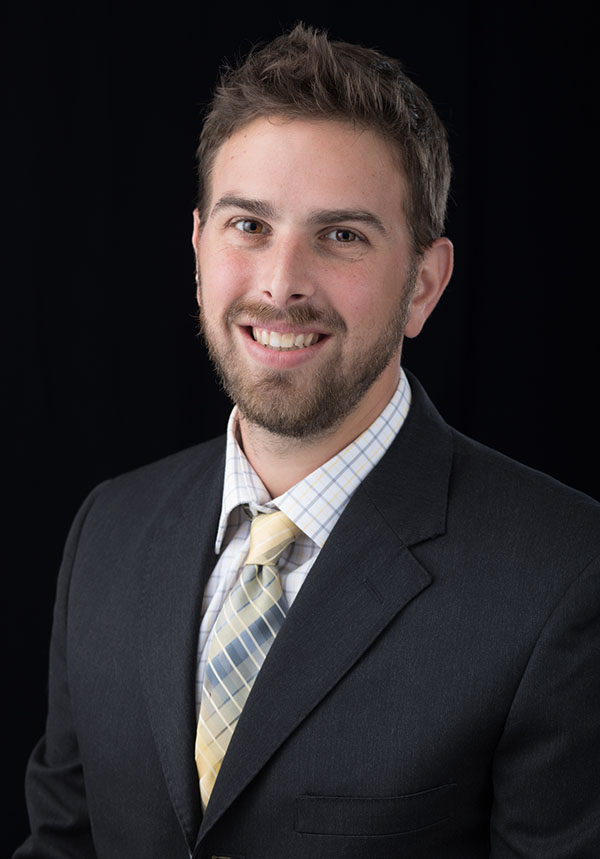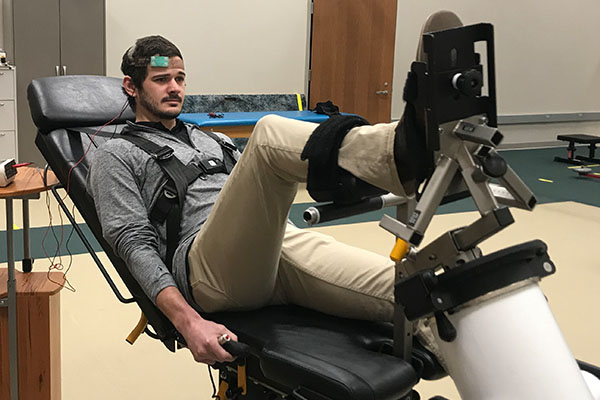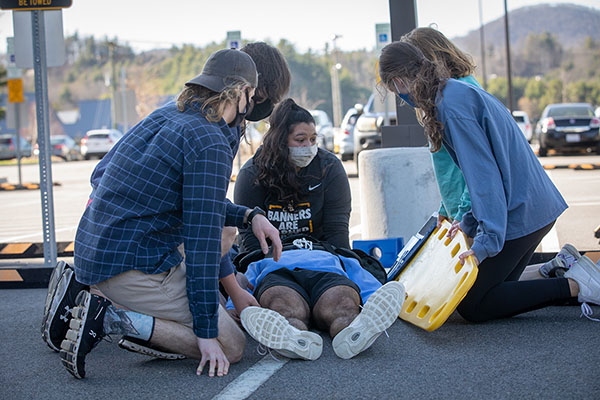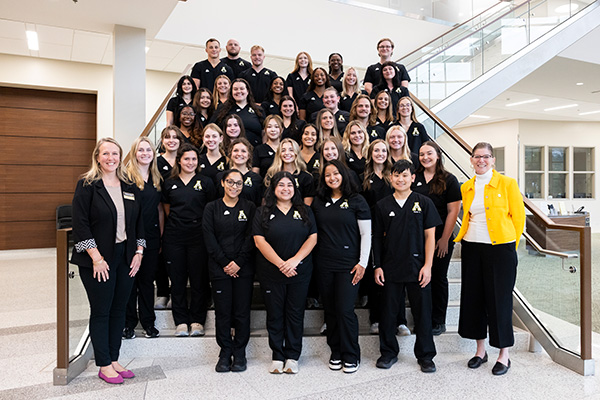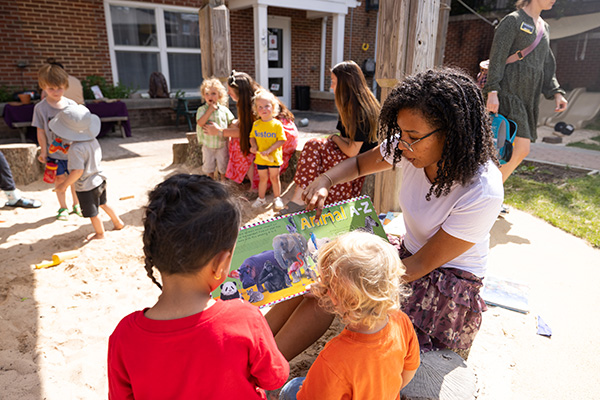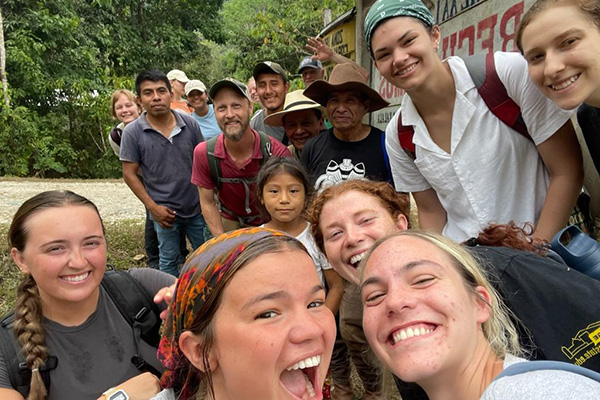A subject receives transcranial direct current stimulation while he performs rehabilitative ankle exercises as part of Dr. Alan Needle’s research project. Needle, an associate professor in Appalachian State University’s Department of Health and Exercise Science, is hoping his research will lead to a decrease in recurrent ankle injuries. His project is supported by grant funding from the National Athletic Trainers’ Association Research and Education Foundation. Photos submitted
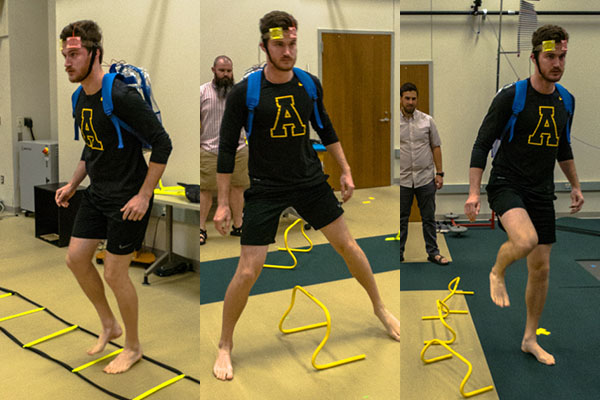
A subject receives transcranial direct current stimulation while he performs rehabilitative ankle exercises as part of Dr. Alan Needle’s research project. Needle, an associate professor in Appalachian State University’s Department of Health and Exercise Science, is hoping his research will lead to a decrease in recurrent ankle injuries. His project is supported by grant funding from the National Athletic Trainers’ Association Research and Education Foundation. Photos submitted
BOONE, N.C. — If you’ve sprained your ankle once, it’s likely it has or will happen again.
According to Appalachian State University’s Dr. Alan Needle, research shows between 50% and 70% of people who have suffered an ankle sprain — the most common injury seen in active people — will suffer another.
Needle, an associate professor in the Department of Health and Exercise Science (HES), has received $57,349 in grant funding from the National Athletic Trainers’ Association (NATA) Research and Education Foundation for research that might alter that trend.
One of the reasons individuals continue to “roll” their ankles during activity, Needle said, is changes in how, post an initial sprain, the brain and nervous system adapt to plan and execute movement. “These changes cause individuals to move in a way that makes them more likely to injure themselves,” he said.
In order to prevent these repetitive injuries, Needle and his research team are proposing methods to address the altered brain and nervous system’s way of coordinating movement using common rehabilitative balancing and agility exercises — while transmitting a low-level electrical current through the brain.
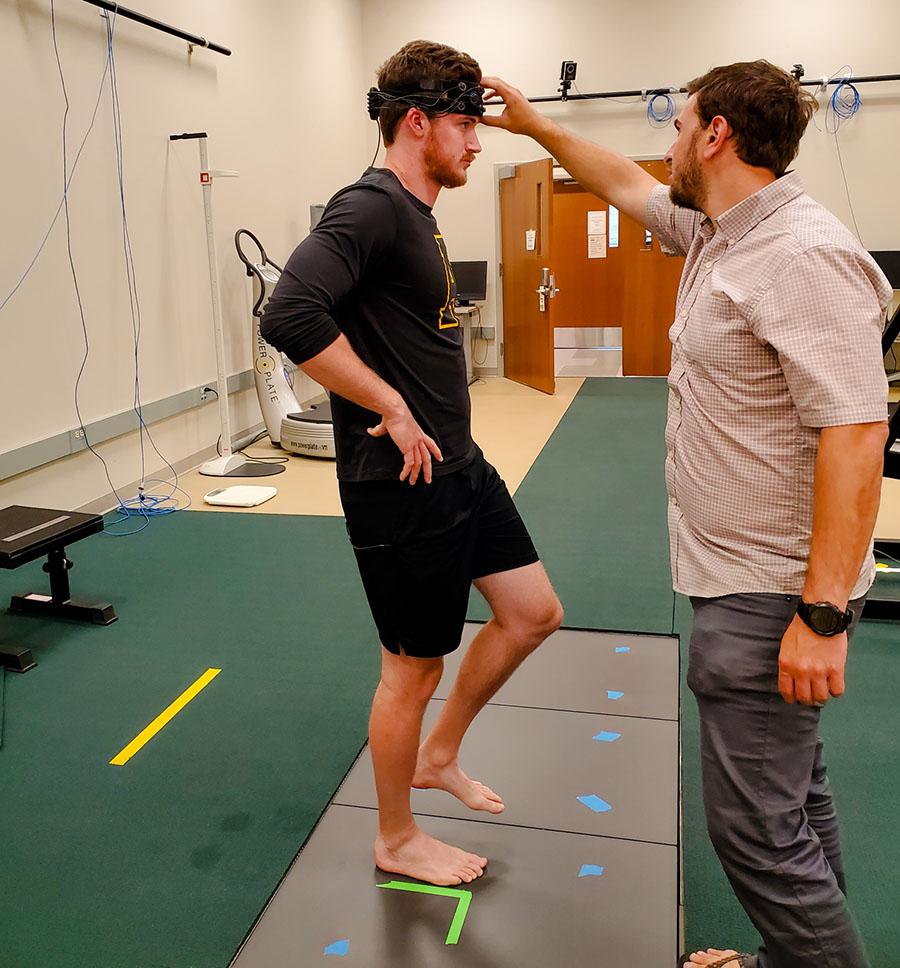
A subject’s brain activity is monitored as he balances as part of a course of rehabilitative ankle exercises. Dr. Alan Needle, associate professor in Appalachian State University's Department of Health and Exercise Science, right, is hoping his research will lead to a decrease in recurrent ankle injuries. His project is supported by grant funding from the National Athletic Trainers’ Association Research and Education Foundation. Photo submitted
By running this current through either the part of the brain that executes movement or through the part of the brain that plans movement, Needle said he hopes to determine if either is better at improving function for patients with repeated ankle sprains over the course of a four-week rehabilitation regimen.
The project, titled “How to TRAIN Pathways: Targeted Rehabilitation of Ankle Instability through Neurological Pathways,” began in May and will continue through August 2024.
Needle’s project collaborators are App State’s Dr. Jennifer Howard, associate professor in the HES department, and Dr. Jared Skinner, assistant professor in the HES department.
What do you think?
Share your feedback on this story.
About the Beaver College of Health Sciences
Appalachian State University’s Beaver College of Health Sciences (BCHS), opened in 2010, is transforming the health and quality of life for the communities it serves through interprofessional collaboration and innovation in teaching, scholarship, service and clinical outreach. The college enrolls more than 3,600 students and offers 10 undergraduate degree programs, nine graduate degree programs and four certificates across seven departments: Kinesiology, Nursing, Nutrition and Health Care Management, Public Health, Recreation Management and Physical Education, Rehabilitation Sciences, and Social Work. The college’s academic programs are located in the Holmes Convocation Center on App State’s main campus and the Levine Hall of Health Sciences, a state-of-the-art, 203,000-square-foot facility that is the cornerstone of Boone’s Wellness District. In addition, the college supports the Appalachian Institute for Health and Wellness and has collaborative partnerships with the Wake Forest University School of Medicine’s Physician Assistant Program, UNC Health Appalachian and numerous other health agencies. Learn more at https://healthsciences.appstate.edu.
About Appalachian State University
As a premier public institution, Appalachian State University prepares students to lead purposeful lives. App State is one of 17 campuses in the University of North Carolina System, with a national reputation for innovative teaching and opening access to a high-quality, cost-effective education. The university enrolls more than 21,000 students, has a low student-to-faculty ratio and offers more than 150 undergraduate and 80 graduate majors at its Boone and Hickory campuses and through App State Online. Learn more at https://www.appstate.edu.
